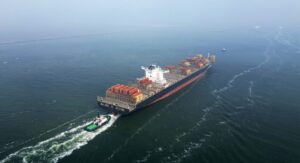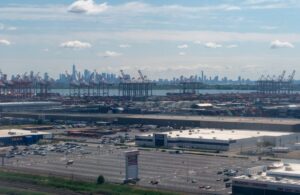DP World has selected Pledge to measure the impact of its road-to-rail programme, the Modal Shift Programme (MSP).
The programme financially incentivises cargo owners to switch from road to rail for freight transport from the Port of Southampton to railheads within a radius of 140 miles, while also helping to address the current under-utilisation of the UK’s rail freight network.
While the volume of cargo moved by rail from Southampton had previously dropped by 10 percentage points in the decade leading to 2023, DP World revealed that the MSP has reversed this trend, increasing the share of freight moved by rail from 21 per cent to 30 per cent since September 2023.
This has made a significant contribution to the UK government’s 2050 target for a 75 per cent increase in rail freight to reduce congestion and emissions on the roads.
Trains generate much lower emissions than trucks carrying the same load – around 80 per cent less – and so making the change can considerably reduce the total emissions created by the port’s shipping and logistics customers. The MSP has already removed 6,400 tonnes of CO2 equivalent (CO2e) in its first six months of operation.
Working out how many kilos of CO2 equivalents are saved for every consignment is calculated using the Pledge platform. This uses the cargo’s weight, origin and destination locations, the type and characteristics of the vehicle used and other factors, such as road characteristics and elevation levels, to establish the road-based carbon footprint for each journey.
The footprint for a rail-based journey, with trucks only used for the ‘last mile’, is also established, and the difference between the two figures is the carbon emission savings made.
READ: DP World witnesses record exports from Senegal
By utilising Pledge, DP World can reportedly understand the exact impact of its programme, for every container that leaves the port by rail and allows for the emissions reporting required by international, national and regional reporting regulations, as well as the figures required for customers’ emission reduction and offsetting targets.
Pledge co-Founder and CEO, David de Picciotto, said: “We are thrilled to be partnering with DP World to create ongoing, data-driven proof of the impact of its Modal Shift Programme.
“Understanding and quantifying emissions is a requirement for global businesses and the vital first step towards reducing them. As is often said, ‘You can’t improve what you don’t measure’. We hope that what is happening in Southampton will inspire ports and other transit hubs worldwide to emulate its success in tackling some of the key challenges of the climate crisis.”
READ: DP World expands Asia Pacific trade network
John Trenchard, Vice President UK Commercial & Supply Chain at DP World, stated: “The Model Shift Programme has allowed our customers to explore how rail can be effectively utilised to achieve lower carbon for international supply chains serving the UK economy.
“Due to the scale and originality of the programme, we wanted to make sure that we worked with a trusted independent third party to calculate the carbon savings from the programme.”
In the same week, DP World welcomed the delivery of two new Rail-Mounted Gantry (RMG) cranes for its London Gateway rail terminal.








